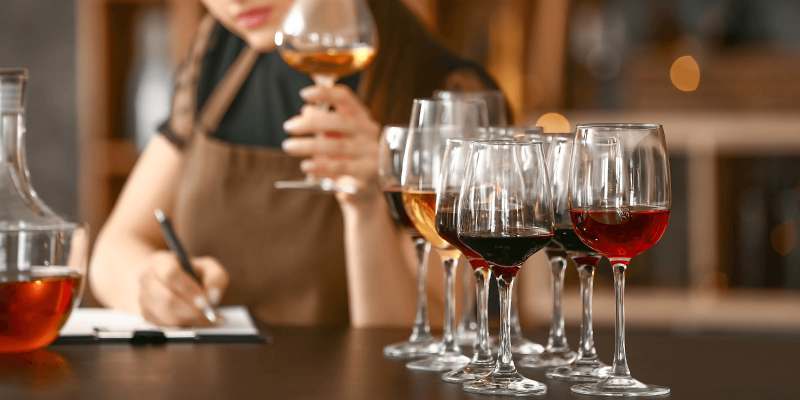Educating Sommeliers Worldwide.
By Beverage Trade Network

Wine holds a dual role in culture and lifestyle: it is celebrated for its sensory pleasures and occasional association with health benefits, while also scrutinized for its potential risks. Sommeliers, as the bridge between the wine world and consumers, are increasingly tasked with navigating these complexities. With new research, evolving U.S. health guidelines, and public figures such as Robert F. Kennedy Jr.—recently named Donald Trump’s choice to head Health and Human Services—adding fuel to the debate, staying informed is critical.
Sommelier Business explores the interplay between wine, health, and public opinion, equipping sommeliers to address consumer questions thoughtfully.
Historically, wine was considered a healthful elixir. From ancient Greece, where Hippocrates prescribed it as medicine, to 19th-century Europe, where wine was touted as a cure-all, its medicinal role was widely accepted. Today, however, wine’s health implications are scrutinized through the lens of modern science, which presents a more nuanced perspective.
Moderation remains a recurring theme. While some studies highlight the potential benefits of moderate wine consumption, excessive alcohol use is linked to significant health risks, including cardiovascular disease and cancer. Sommeliers must tread carefully, balancing historical reverence for wine with the realities of current research.
Moderate consumption, particularly as part of the Mediterranean diet, remains a key area of interest. This diet emphasizes whole, nutrient-rich foods paired with small amounts of wine, consumed during meals. Studies have suggested that this approach may reduce the risk of heart disease and support longevity.
Sommeliers can draw on this context to position wine as part of a balanced lifestyle. However, this narrative must be paired with a clear understanding of individual health risks and a commitment to moderation.

Robert F Kennedy Jr.; source: The Australian
The nomination of Robert F. Kennedy Jr. as Donald Trump’s choice to lead Health and Human Services has placed alcohol guidelines under renewed scrutiny. Kennedy has been an outspoken critic of U.S. health policies, claiming that guidelines around alcohol, including wine, maybe overly restrictive or influenced by political agendas.
Kennedy’s comments resonate with those who view moderate wine consumption as beneficial and question the increasing emphasis on abstinence in public health messaging. His criticism includes a focus on the U.S. Dietary Guidelines for Americans, which recommend limiting alcohol intake to two drinks per day for men and one for women. While these guidelines are widely accepted, some research suggests that even moderate drinking may increase the risk of diseases such as cancer.
For sommeliers, Kennedy’s views underscore the importance of addressing conflicting opinions among clients. This requires a careful, balanced approach that acknowledges divergent perspectives while reinforcing evidence-based recommendations.
The relationship between alcohol and cancer remains one of the most significant health concerns. The International Agency for Research on Cancer (IARC) has classified alcohol as a Group 1 carcinogen, linking its consumption to cancers of the breast, liver, colon, and esophagus. Even moderate drinking may contribute to these risks, according to some studies.
These findings pose challenges for sommeliers who must balance transparency about risks with a celebration of wine’s cultural and sensory virtues. Addressing these concerns candidly can build trust with consumers, encouraging informed and mindful consumption.

Dr. Laura Catena; source: Laura Catena
The U.S. Dietary Guidelines for Americans continue to shape the discourse on alcohol consumption. However, these guidelines are not without controversy. Critics argue that the recommendations fail to account for individual differences in genetics, health, and lifestyle. Others, like Kennedy, claim that political and industrial influences may shape the messaging.
Laura Catena, a Stanford-trained physician and fourth-generation vintner, critiques alarmist headlines about alcohol and health in a recent article, arguing that such messaging often relies on inconclusive or biased science. Drawing on her medical background and extensive review of scientific literature, Catena highlights several key points:
Nuanced Health Effects: While heavy drinking has clear harmful effects, moderate alcohol consumption has been associated with potential benefits, including reduced risks of cardiovascular diseases, strokes, and diabetes. Observational studies have shown cardioprotective effects in moderate drinkers, attributed to mechanisms like increased HDL cholesterol and reduced clot formation.
Flaws in Recent Studies: Catena critiques some high-profile studies cited in anti-alcohol articles. For instance, a 2023 JAMA review and a Journal of Studies on Alcohol and Drugs paper dismiss moderate drinking’s benefits but rely on cherry-picked data and omit key studies. She notes methodological issues, including misrepresented references and failure to account for drinking patterns.
Alcohol and Cancer: Catena acknowledges the link between heavy alcohol consumption and increased cancer risk but argues that the risks for moderate drinkers are often overstated. For example, moderate drinking may increase breast cancer risk slightly but can lower risks of other cancers. A balanced assessment should also consider other major cancer risk factors, such as obesity and smoking.
Broader Health Implications: Beyond cardiovascular and cancer-related effects, Catena points to studies suggesting potential cognitive and stress-reduction benefits from light to moderate alcohol consumption. These findings underline alcohol’s complex and multifaceted impacts on health.
Criticism of WHO Messaging: She criticizes the World Health Organization’s blanket statement that no level of alcohol is safe, suggesting it dismisses nuanced data in favor of prohibitionist ideology. Catena calls for more balanced public health messaging that allows individuals to make informed decisions in consultation with healthcare providers.
In Defense of Wine: To combat misinformation, Catena launched In Defense of Wine, an online resource promoting evidence-based information about moderate alcohol consumption’s health effects.
Sommeliers can use these debates as an opportunity to educate clients. Highlighting the global diversity of drinking cultures, such as the Mediterranean model, can provide context for the guidelines while emphasizing the importance of moderation.
As public awareness of alcohol-related risks grows, the market for non-alcoholic and low-alcohol wines has expanded dramatically. According to IWSR, the category is projected to experience double-digit growth over the next decade, driven by younger, health-conscious consumers.
Non-alcoholic wines, such as those from Leitz Eins-Zwei-Zero or Freixenet 0.0, offer sommeliers an opportunity to diversify their offerings while meeting consumer demand for wellness-oriented options. These products allow clients to enjoy the rituals and flavors of wine without the risks associated with alcohol.
Health-conscious consumers, particularly millennials and Gen Z, increasingly seek wines that align with their wellness and sustainability values. Organic, biodynamic, and low-intervention wines are especially popular, as they are perceived to minimize chemical exposure while supporting environmental stewardship.
Sommeliers should prioritize these trends in their wine programs, curating selections that emphasize both health and sustainability. Highlighting the practices of producers committed to these principles can create a compelling narrative that resonates with modern consumers.
Sommeliers must balance their role as purveyors of indulgence with their responsibility to promote mindful consumption. Transparent communication about wine’s health risks and benefits is essential for building trust with clients.
Key strategies include:
- Education: Stay informed about evolving research, public opinions, and developments, including Robert F. Kennedy Jr.’s potential influence on U.S. health policies.
- Moderation: Encourage quality over quantity, emphasizing the enjoyment of wine in small, thoughtful servings.
- Transparency: Acknowledge health risks, particularly in relation to alcohol’s link to cancer, without resorting to fear-mongering.
- Inclusivity: Offer non-alcoholic and low-alcohol options to cater to diverse consumer preferences.
[[relatedPurchasesItems-61]]
Moderation Is Paramount: Reinforce the importance of mindful consumption while addressing consumer concerns.
Science Evolves: Be prepared to navigate contradictions in health research and public opinion.
Cater to Trends: Embrace wellness-focused products, including sustainable and non-alcoholic options.
Engage Honestly: Address client questions about figures like Robert Kennedy Jr. and conflicting guidelines with empathy and transparency.
The conversation around wine and health continues to evolve, shaped by new research, public figures like Robert F. Kennedy Jr., and shifting consumer priorities. For sommeliers, staying informed and adaptable is key to navigating these complexities. By promoting moderation, embracing innovation, and fostering transparency, you can enhance your role as a trusted guide in the ever-changing world of wine.
Header Image Source: Shutterstock
Also Read:
Sustainability in Fine Dining
The Rise and Rise of Mindful Drinking: Non-Alcoholic Beverages Take Center Stage
Creating Memorable Mulled Wines with the Right Wine Selection